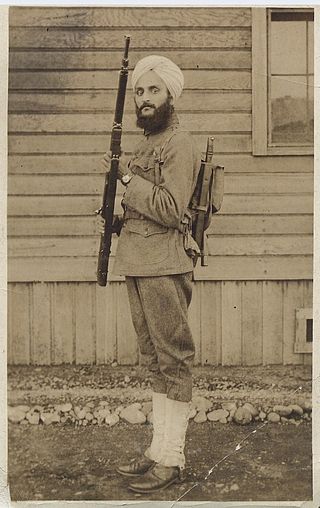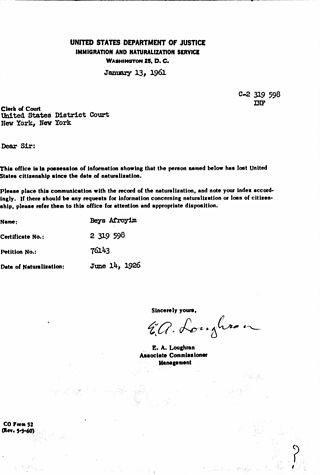Related Research Articles

The Chinese Exclusion Act was a United States federal law signed by President Chester A. Arthur on May 6, 1882, prohibiting all immigration of Chinese laborers for 10 years. The law made exceptions for merchants, teachers, students, travelers, and diplomats. The Chinese Exclusion Act was the first major U.S. law ever implemented to prevent all members of a specific national group from immigrating to the United States, and therefore, helped shape twentieth-century race-based immigration policy.

George Frisbie Hoar was an American attorney and politician who represented Massachusetts in the United States Senate from 1877 to 1904. He belonged to an extended family that became politically prominent in 18th- and 19th-century New England.
United States v. Wong Kim Ark, 169 U.S. 649 (1898), was a landmark decision of the U.S. Supreme Court which held that "a child born in the United States, of parents of Chinese descent, who, at the time of his birth, are subjects of the Emperor of China, but have a permanent domicile and residence in the United States, and are there carrying on business, and are not employed in any diplomatic or official capacity under the Emperor of China", automatically became a U.S. citizen at birth. This decision established an important precedent in its interpretation of the Citizenship Clause of the Fourteenth Amendment to the Constitution.

Voting rights, specifically enfranchisement and disenfranchisement of different groups, has been a moral and political issue throughout United States history.
United States v. Bhagat Singh Thind, 261 U.S. 204 (1923), was a case in which the Supreme Court of the United States decided that Bhagat Singh Thind, an Indian Sikh man who identified himself as an Aryan, was ineligible for naturalized citizenship in the United States. In 1919, Thind filed a petition for naturalization under the Naturalization Act of 1906 which allowed only "free white persons" and "aliens of African nativity and persons of African descent" to become United States citizens by naturalization.

Bhagat Singh Thind was an Indian American writer and lecturer on spirituality who served in the United States Army during World War I and was involved in a Supreme Court case over the right of Indian people to obtain United States citizenship.
Asian immigration to the United States refers to immigration to the United States from part of the continent of Asia, which includes East Asia, South Asia, and Southeast Asia. Asian-origin populations have historically been in the territory that would eventually become the United States since the 16th century. The first major wave of Asian immigration occurred in the late 19th century, primarily in Hawaii and the West Coast. Asian Americans experienced exclusion, and limitations to immigration, by the United States law between 1875 and 1965, and were largely prohibited from naturalization until the 1940s. Since the elimination of Asian exclusion laws and the reform of the immigration system in the Immigration and Nationality Act of 1965, there has been a large increase in the number of immigrants to the United States from Asia.

The Naturalization Act of 1790 was a law of the United States Congress that set the first uniform rules for the granting of United States citizenship by naturalization. The law limited naturalization to "free White person(s) ... of good character", thus excluding Native Americans, indentured servants, enslaved people, free Africans, Pacific Islanders, and non-White Asians. This eliminated ambiguity on how to treat newcomers, given that free black people had been allowed citizenship at the state level in many states. In reading the Naturalization Act, the courts also associated whiteness with Christianity and thus excluded Muslim immigrants from citizenship until the decision Ex Parte Mohriez recognized citizenship for a Saudi Muslim man in 1944.

The history of Chinese Americans or the history of ethnic Chinese in the United States includes three major waves of Chinese immigration to the United States, beginning in the 19th century. Chinese immigrants in the 19th century worked in the California Gold Rush of the 1850s and the Central Pacific Railroad in the 1860s. They also worked as laborers in Western mines. They suffered racial discrimination at every level of society. Many Americans were stirred to anger by the "Yellow Peril" rhetoric. Despite provisions for equal treatment of Chinese immigrants in the 1868 Burlingame Treaty between the U.S. and China, political and labor organizations rallied against "cheap Chinese labor".

Afroyim v. Rusk, 387 U.S. 253 (1967), was a landmark decision of the Supreme Court of the United States, which ruled that citizens of the United States may not be deprived of their citizenship involuntarily. The U.S. government had attempted to revoke the citizenship of Beys Afroyim, a man born in Poland, because he had cast a vote in an Israeli election after becoming a naturalized U.S. citizen. The Supreme Court decided that Afroyim's right to retain his citizenship was guaranteed by the Citizenship Clause of the Fourteenth Amendment to the Constitution. In so doing, the Court struck down a federal law mandating loss of U.S. citizenship for voting in a foreign election—thereby overruling one of its own precedents, Perez v. Brownell (1958), in which it had upheld loss of citizenship under similar circumstances less than a decade earlier.

The Indian Citizenship Act of 1924, was an Act of the United States Congress that granted U.S. citizenship to the indigenous peoples of the United States. While the Fourteenth Amendment to the United States Constitution defines a citizen as any persons born in the United States and subject to its laws and jurisdiction, the amendment had previously been interpreted by the courts not to apply to Native peoples.

The Naturalization Act of 1870 was a United States federal law that created a system of controls for the naturalization process and penalties for fraudulent practices. It is also noted for extending the naturalization process to "aliens of African nativity and to persons of African descent" while also maintaining exclusion of the process to naturalized Chinese Americans and other groups.
The War Brides Act was enacted to allow alien spouses, natural children, and adopted children of members of the United States Armed Forces, "if admissible," to enter the U.S. as non-quota immigrants after World War II. More than 100,000 entered the United States under this Act and its extensions and amendments until it expired in December 1948. The War Brides Act was a part of new approach to immigration law that focused on family reunification over racial exclusion. There were still racial limits that existed particularly against Asian populations, and Chinese spouses were the only Asian nationality that qualified to be brought to the United States under the act. Additionally, the War Brides Act was well supported and easily passed because family members of servicemen were the recipients, but there were concerns over marital fraud which caused some tensions.
United States citizenship can be acquired by birthright in two situations: by virtue of the person's birth within United States territory or because one or both of their parents is a US citizen. Birthright citizenship contrasts with citizenship acquired in other ways, for example by naturalization.

Philippine nationality law details the conditions by which a person is a national of the Philippines. The two primary pieces of legislation governing these requirements are the 1987 Constitution of the Philippines and the 1939 Revised Naturalization Law.
The Citizenship Clause is the first sentence of the Fourteenth Amendment to the United States Constitution, which was adopted on July 9, 1868, which states:
All persons born or naturalized in the United States, and subject to the jurisdiction thereof, are citizens of the United States and of the State wherein they reside.

The Scott Act was a United States law that prohibited U.S. resident Chinese laborers from returning to the United States. Its main author was William Lawrence Scott of Pennsylvania, and it was signed into law by U.S. President Grover Cleveland on October 1, 1888. It was introduced to expand upon the Chinese Exclusion Act passed in 1882 and left an estimated 20,000-30,000 Chinese outside the United States at the time of its passage stranded, with no option to return to their U.S. residence.

Hong Yen Chang was reportedly the first Chinese immigrant licensed to practice law in the United States. Though admitted to the New York State Bar, he was denied admission to the California State Bar in 1890. He remained a prominent member of the Chinese community and went on to lead a distinguished career in banking and diplomacy.
Alien land laws were a series of legislative attempts to discourage Asian and other "non-desirable" immigrants from settling permanently in U.S. states and territories by limiting their ability to own land and property. Because the Naturalization Act of 1870 had extended citizenship rights only to African Americans but not other ethnic groups, these laws relied on coded language excluding "aliens ineligible for citizenship" to prohibit primarily Chinese and Japanese immigrants from becoming landowners without explicitly naming any racial group. Various alien land laws existed in over a dozen states. Like other discriminatory measures aimed at preventing minorities from establishing homes and businesses in certain areas, such as redlining and restrictive covenants, many alien land laws remained technically in effect, forgotten or ignored, for many years after enforcement of the laws fell out of practice.
Guam is an island in the Marianas archipelago of the Northern Pacific located between Japan and New Guinea on a north–south axis and Hawaii and the Philippines on an east–west axis. Inhabitants were Spanish nationals from 1521 until the Spanish–American War of 1898, from which point they derived their nationality from United States law. Nationality is the legal means in which inhabitants acquire formal membership in a nation without regard to its governance type. In addition to being United States nationals, people born in Guam are both citizens of the United States and citizens of Guam. Citizenship is the relationship between the government and the governed, the rights and obligations that each owes the other, once one has become a member of a nation. Though the Constitution of the United States recognizes both national and state citizenship as a means of accessing rights, Guam's history as a territory has created both confusion over the status of its nationals and citizenship and controversy because of distinctions between jurisdictions of the United States.
References
[1] Asians and Pacific Islanders in the Civil War from this containing site: Asians and Pacific Islanders In the Civil War
[2] Association to commemorate the Chinese serving in the American Civil War
[3] Chinese Exclusion Act - 1882, Definition & Purpose - HISTORY
[4] Chinese in the Civil War: Ten Who Served - by Ruthanne Lum McCunn
[5] John / William Hang
[6] John Ah Heng, Naval Records, National fuchives, Washington D.C.
[7] New York, Grand Army of the Republic Records, 1866-1931
[8] New York Herald: February 10, 1911, "Seeks His Citizenship. Chinese Veteran of Civil War Lost Papers of Naturalization, Duplicates Being Taken Away."
[9] New York Tribune, Aug. 18, 1904. New-York tribune. [volume] (New York [N.Y.]) 1866–1924, August 17, 1904, Page 2, Image 2
[10] The Logan Republican. [volume] (Logan, Utah) 1902–1924, February 14, 1911, PAGE THREE, Image 3
[11] U.S. Navy Pensions Index, 1861-1910
[12] William Hang, Naturalization Records, National Archives, Northeast Region, New York City.